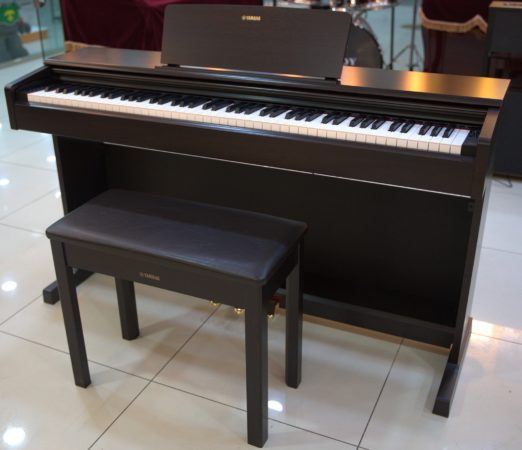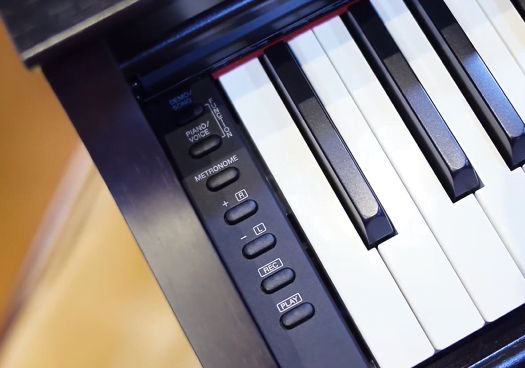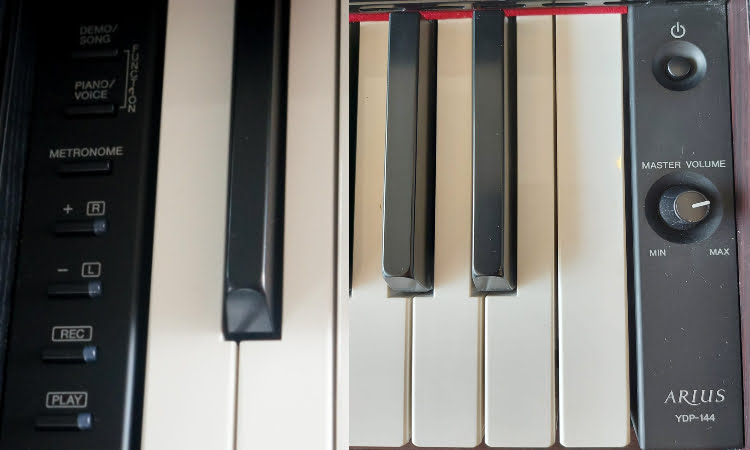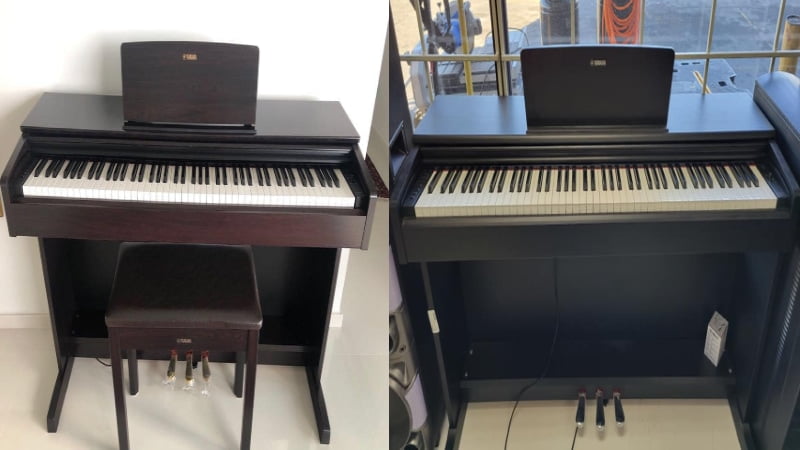Find out which piano is worth your time and money in this Yamaha YDP-143 vs 144 comparisons.
If you’re looking for a good console digital piano at a fair price, you’ve probably already stumbled across the Yamaha YDP-143 and the YDP-144. These are two great pianos right in the middle of the Arius range.
And in this Yamaha YDP-143 vs 144 comparisons, we found out which model is the better option.
After testing out the pianos myself and researching all the features, I found that the Yamaha YDP-144 has a slight advantage. While it is more expensive, you’re paying for a much better tone generator, which can make a huge difference if you’re particular about tone.
But if you need to save some money but still want to find a high-quality digital piano, the Yamaha YDP-143 would serve you just fine. It still has quality voices and has a great hammer action system to provide a realistic feel.
Yamaha YDP-143 vs 144: Comparison Chart




Last update on 2025-04-17 / Affiliate links / Images from Amazon Product Advertising API
Yamaha YDP-143 vs 144: The Features
It can be hard to objectively compare two different pianos. However, in making this review, I found that the best way to be objective is to compare all the features against each other. And after comprehensive testing of the features, the final score was 3-2 in favor of the Yamaha YDP-144. The comparison was very close, but in the end, the high-quality voices of the Yamaha YDP-144 put over the YDP-143.
Tone
The winner: Yamaha YDP-144
Whenever I try out digital pianos, the first thing I check out is the tone. And when comparing these two pianos, I found that the Yamaha YDP-144 had more realistic voices. While the YDP-143 still has a decent tone, it doesn’t compare to the YDP-144. With that said, both pianos still have a similar sound library.
+Tone Generation
Both of these pianos use top-quality tone engines. This is something you can expect when shopping for Yamaha pianos in this range. However, they still use different tone engines. The Yamaha YDP-143 sports the Yamaha CF Sound Engine, while the YDP-144 uses the CFX Sampling method.
Both of these tone engines revolve around the same concept. The pianos are loaded with top-quality samples recorded from Yamaha CF Concert Grand Pianos. These are some of the most coveted grand pianos on the market. And since Yamaha uses the best recording equipment to record the samples, you can rest assured of top-quality piano voices.
The CFX Sampling method is the upgrade to the Pure CF Sound Engine. This is available on all Arius pianos after 2019, and produces higher-quality and more realistic piano voices. While the tones may not be as good as those in the Clavinova line, it is much better than the Pure CF Sound Engine.
So, if tone quality is your top priority with your digital pianos, then the Yamaha YDP-144 is your best bet.

+Sound Library
While the Yamaha YDP-144 has the better tone engine, both of the pianos have a similar library. The Yamaha YDP-144 is a slight upgrade over the 143, but when it comes to their range of tones, these two models are very similar. Both of these pianos only have 10 different voices. This is fairly limiting, but considering the quality of the voices, that isn’t too much of a problem.
While there are 10 different voices to choose from, the piano and electric piano tones are the ones that stand out. You get very bright and realistic voices, which is a huge plus for people who need high-quality piano tones.
On top of that, you have a range of non-piano tones as well. This includes organ, strings, and even bass voices. That way, you aren’t limited to only playing classical music on these pianos.
Feel
The winner: Tie
These pianos feel identical when I tested them out, but that isn’t a bad thing. Both of the pianos have a great hammer action system and even have textured keys. That way, playing the pianos felt like playing an acoustic piano.
And while there were some flaws, both of the pianos easily outperformed their respective price range.
+Hammer Action
The Yamaha YDP-143 and the YDP-144 both have the Graded Hammer Standard action. This is one of the best and most sought-after hammer action systems on the market. The GHS action replicates the feel of an acoustic piano with slightly heavier keys on the left side than the right side.
This mimics the way an acoustic piano’s hammer action is set up and Yamaha does a great job at it. In fact, in this price range, you won’t find hammer action systems that beat out the GHS.
With that said, considering that the YDP-144 is significantly more expensive than the YDP-143, it would have been nice to see the GH3 hammer action. While the GHS produces a realistic weight, the springback is fairly slow, which some experienced pianists might notice.
+Key Texture

Another cool feature of both pianos is the key texture. While they both utilize plastic keys, both pianos have a matte coating on the black keys, giving off a slight textural difference. There are many pianos in this price range that have glossy plastic keys. These keys perform well, but if you’re used to wooden acoustic pianos, the difference is glaring.
Even with the matte black key tops, the pianos still feel plastic. This isn’t a knock on the quality, since real wooden keys are expensive and hard to come by. And since the pianos have a coating on the key tops, they feel slightly more realistic than glossy plastic keys.
Piano Features
The winner: Tie
One area where I thought the Yamaha YDP-144 would perform better is the piano features. This is because brands usually introduce a range of different piano features whenever they upgrade a product line. However, I found that both the YDP-143 and YDP-144 have the same extra piano features, which was a slight let down.
With that said, both pianos come with very useful features, which is why they are tied int his category.
+Playing Modes
The only additional playing mode available on these pianos is layering mode. With layering mode, you can combine and blend two different voices at the same time. This is a cool feature as it allows you to create your own unique voice combinations.
This is great for adding thickness and texture to your tone. For example, if you’re accompanying a singer and need a bit more power in your tone, you can mix a subtle string layer to your piano tone, which is something many professional pianists do.
Additionally, you can record your playing and listen back on it with these pianos. While the recording quality isn’t for studio releases, it is good enough to judge your own playing. That way, you can figure out where you need to improve and whether or not you’ve got a certain technique down.

+Effects
Most piano players, especially when playing classical music, only need one additional effect: reverb. This is to mimic the way sound bounces in certain locations and venues like concert halls and auditoriums. So, it’s a huge advantage that both of these pianos have built-in reverb effects.
On top of that, there are four different reverb presets for these pianos. That way, you can really find the type of reverb you need and apply it to your tone.
It would have been nice to see additional effects like chorus or IAC on these pianos, but considering their price point, it’s easily forgivable.
Yamaha YDP-143 vs 144: The Similarities
These pianos actually come with more than a few similarities. The reason for this is that the Yamaha YDP-144 is the direct upgrade to the YDP-143. So, all the best features of the YDP-143 are present on the YDP-144. This includes the great hammer action, piano features, and even the sound library.
In fact, the only real difference between these two pianos is the tone engine. The CFX Tone Engine is more advanced than the CF Sound Engine, which you can find on the Yamaha YDP-143. So, if you want to spend a little bit extra for a slightly better tone, then the YDP-144 is the best option for you.
But if you’re on a budget or don’t really need the slightly better tone, you might be better off with the YDP-143.
Quick Rundown of the Yamaha YDP-143
- The Pure CF Sound Engine faithfully reproduces the tone of a meticulously sampled, acclaimed Yamaha 9 feet CFIIIS concert grand piano, allowing for incredibly dynamic and expressive playing
- GHS weighted action is heavier in the low keys and lighter in the high keys, just like an acoustic piano
- 50 classic piano songs are provided in the built in song memory as well as in a music book, "50 Greats for the Piano"
- The Controller App for iOS devices adds a rich graphical user interface, allowing for quick and easy navigation and configuration
- The 2 track song recorder allows players to practice one hand at a time, or record their next hit single. Half damper pedal control creates more detailed nuance and subtlety when playing, similar to pedaling on a grand piano.Data Capacity:100 KB/Song (Approx. 11,000 notes)
Last update on 2025-04-17 / Affiliate links / Images from Amazon Product Advertising API
Quick Rundown of the Yamaha YDP-144
- Your purchase includes One Yamaha Arius Series, YDP144 model | Bench, 50 Classical Music Masterpieces Book, Owner’s manual & Quick Operation Guide
- Piano dimensions – 53-7/16” W x 32-1/16” H x 16-5/8” | Weight – 83 lbs. | Number of pedals – 3 | Max polyphony – 192 | Number of voices – 10 | Headphones – (2) Standard Stereo phone jack | With Recording and Playback capabilities
- GHS weighted action is heavier in the low keys and lighter in the high keys, just like an acoustic piano
- Half-damper pedal control allows for continuously increasing amounts of sustain as the pedal is depressed
- The CFX Premium Grand Piano Voice recreates the power and tone of the flagship CFX concert grand piano from Yamaha
Last update on 2025-04-17 / Affiliate links / Images from Amazon Product Advertising API
Product Videos
Related Articles to Yamaha Ydp 143
- Yamaha YDP-103 Vs 143: Which Is The Better Arius Model?
- Casio PX-870 Vs Yamaha YDP-143: A Look At Two Top Digital Console Pianos
- Casio PX-770 Vs Yamaha YDP-143: Which Is The Better Piano For The Money?
Related Articles to Yamaha Ydp 144
- Yamaha YDP144 vs YDP-144R: What’s the Difference?
- Yamaha YDP-144 vs YDP-S54: What’s the Difference?
- Yamaha YDP-144 vs 184: Which Is the Best Arius Model for the Money?
- Yamaha YDP-144 vs YDP-181: Is the YDP-144 a Worthy Upgrade?
- Yamaha YDP-144 vs Roland F-140R: Which Digital Piano Do You Need?
- Yamaha YDP-144 vs Kawai KDP-120: Which Piano Is the Best?
- Yamaha YDP-144 vs Kawai KDP-110: Why the YDP-144 Is the Better Piano
- Yamaha YDP-144 vs 164: Which Is the Better Arius Piano?
- Yamaha DGX-660 vs YDP-144: Which Is the Better Yamaha Piano?
- Yamaha DGX-670 vs YDP 144: Finding the Best Digital Piano
- Yamaha YDP144 vs 163: Which Is The Best Arius?
- Yamaha YDP144 vs S34: Which Suits Your Style Better?
- Yamaha YDP-103 Vs 144: A Battle Of Two Arius Models
- Casio PX-870 Vs Yamaha YDP-144: Which Is The Better Console Digital Piano?
- Casio PX-770 vs Yamaha YDP-144: Which Is The Better Digital Piano?
References:
- Yamaha YDP-143: https://www.pianodreamers.com/yamaha-ydp143-review/
- Yamaha YDP-144: https://www.pianodreamers.com/yamaha-ydp144-review/
Lulacruza is an electronic folk duo operating at the junction of the hypermodern and the ancient. Our music weaves together hypnotic female singing, South American folk instruments and electronic processing, while channeling pulsating waves from the source of creation.
Lalucruza is also a community where you can connect with other music lovers to collaborate, exchange ideas and share knowledge. A platform for who wants to learns the basics of playing piano, guitar, drum masters’ technique, etc.. is the premise of our website.
